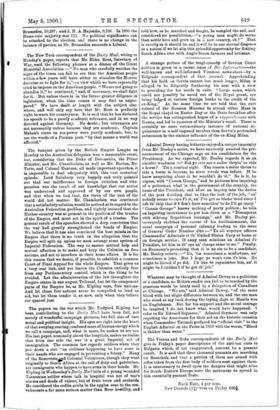The papers on the war which Mr. Rudyard Kipling has
been contributing to the Daily Mail have been full, not merely of wonderful campaign pictures, but full also of rare moral and political insight. His eyes see right into the heart of that swaying, roaring, confused mass of human energy which we call a campaign, and, what is more, he makes us see too. His last paper, nominally about the hospitals, makes us realise that from one side the war is a great Imperial act of immigration. The common law regards soldiers when they put down a riot "as civilians happening to have arms in their hands who are engaged in preventing a felony." Many of the Reservietsopd Colonial Volunteers, though they went originally to &mt.° Africa at the call of duty and patriotism, are immigrants who happen to have arms in their hands. Mr. Kipling in Wednesday's Daily Mail tells of a young wounded Tasmanian soldier whose talk in hospital was not of war's alarms and deeds of valour, but of fruit trees and orchards. He considered the codlin-grubs in the apples sent to the con- valescents a far more serious matter than Boer hostility, and
told how, as he marched and fought, he sampled the soil, and considered its possibilities,—" a young man might do worse than settle here and grow up in a new country, eh ? " That is exactly as it should be, and it will be to our eternal disgrace as a nation if we let slip this splendid opportunity for dotting South Africa over with Anglo-Saxon farmers and artisans.






































 Previous page
Previous page